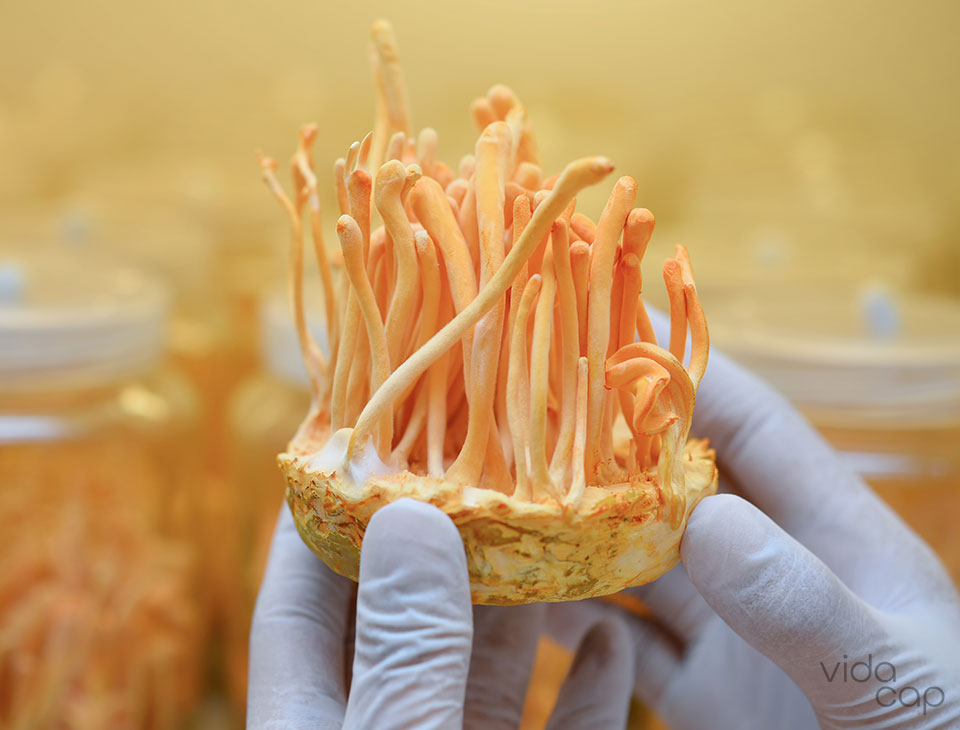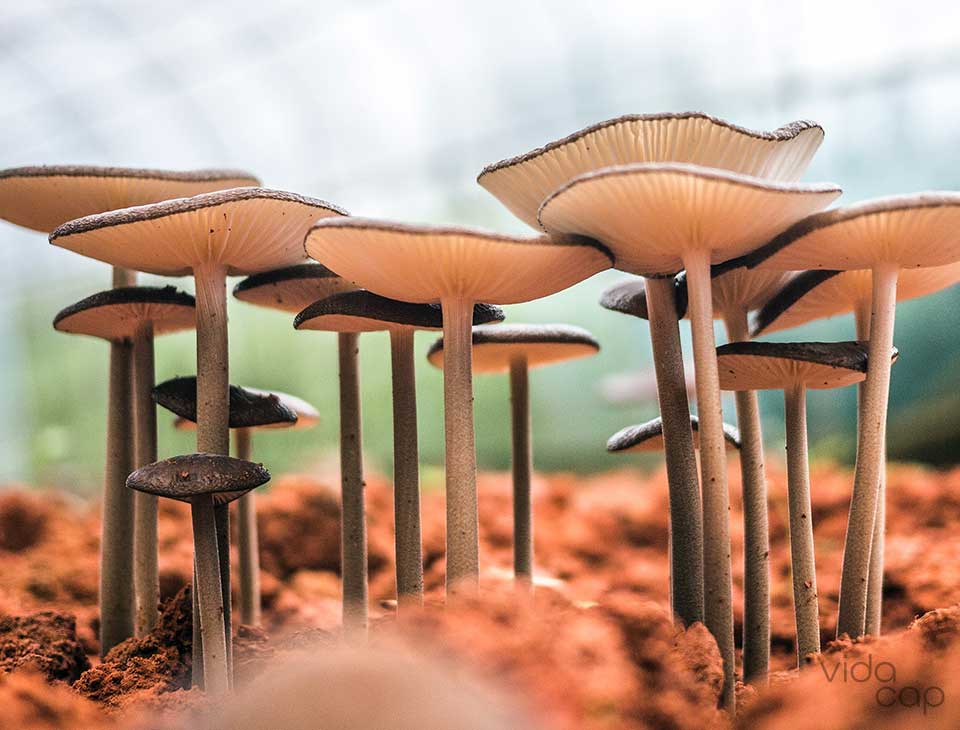
Agaricus Blazei: What Are the Benefits?
 Audrey Ferguson |
Updated on: March 20, 2024
Audrey Ferguson |
Updated on: March 20, 2024
Agaricus blazei mushrooms are native to Brazil but became popular in Japan during the 20th century due to their purported therapeutic properties. Since then, they have been the subject of many research studies and are now becoming well-known for their potential benefits.
Read on for our guide to this unique mushroom and find out why it is receiving so much scientific interest.
What Are Agaricus Blazei Mushrooms?
Agaricus blazei is known by several other names, including its alternative Latin name, Agaricus subrufescens. In Brazil, it is called cogumelo do sol (sun mushroom), and in Japanese, it is known as himematsutake. It is also sometimes known as Royal Agaricus or Piedade mushroom.
Piedade is a region in Sao Paulo, Brazil, where Japanese researcher Takatoshi Furomoto first discovered Agaricus blazei mushrooms in 1960. He became keenly interested in the species due to its apparent benefits.
He noted that local people used it for various ailments, including diabetes, high cholesterol, hepatitis, heart disease, and more. Furthermore, there were anecdotal reports that people in the area had a lower-than-average incidence of chronic disease.

Furomoto sent a sample of Agaricus blazei spores back to Japan for investigation and initiated research into its potential medicinal properties. The results of the first studies were so encouraging that Agaricus blazei rapidly rose to fame.
However, an unintended and unfortunate consequence of the mushroom’s success was that growing demand caused prices to rise exponentially. This was good news for Brazilian mushroom farmers, but it left many locals unable to afford the Agaricus blazei mushrooms that had been part of their lives for so long. It also led to some unethical marketing practices by those eager to profit from the mushroom’s newfound popularity.
Nowadays, many people are growing these fungi worldwide, and various Agaricus blazei supplements are available. Some contain the mushrooms alone, while others combine it with other species, such as lion’s mane and reishi.
In terms of appearance, Agaricus blazei mushrooms are brownish-gold with a short, hard stem and chocolate-brown spore print. They originally had a powerful flavor that made them rather unpleasant to eat. However, cultivated varieties have developed a milder taste over the years and are much more palatable.
Agaricus Blazei Benefits
There is a currently reasonable amount of research on the most significant Agaricus blazei health benefits.
It includes a range of animal studies and clinical trials on various conditions, including diabetes, high cholesterol, and liver disease. However, most of the current research focuses on the mushroom’s potential immune-enhancing and anti-tumor properties.
Agaricus blazei contains numerous bioactive compounds, the best studied being beta-glucan polysaccharides. They are complex molecules well-known for their immunomodulating properties. What this means is that they could either stimulate or suppress immune function, depending on the circumstances.
Agaricus Blazei and Immune Function
Research suggests Agaricus blazei mushrooms affect immune function in several distinct ways. They may also promote apoptosis, a natural process by which damaged or defective cells self-destruct.
However, the results of clinical trials on Agaricus blazei are mixed. For example, a 2015 study on patients with multiple myeloma produced conflicting results. The participants took Agaricus blazei or a placebo for three weeks while undergoing high-dose chemotherapy with stem cell support.
At the end of the trial, those who took the mushroom extract had significant alterations in several inflammatory markers. However, there were no significant differences between the groups in terms of treatment response, time to new treatment, or overall survival. Therefore, further research is required.
Agaricus Blazei and Inflammation
Another interesting area of study is how Agaricus blazei could impact inflammatory conditions, including ulcerative colitis (UC) and Crohn’s disease (CD). Once again, though, the evidence is mixed.
A 2010 study found that these mushrooms could decrease an inflammatory marker called fecal calprotectin in patients with UC but not CD. This aligns with research from 2016 indicating that UC patients may experience symptomatic improvements during Agaricus blazei treatment.
Another publication suggested that CD patients may also experience some improvements. However, in this study, there were no statistically significant differences between the mushroom and placebo groups.
Agaricus Blazei Nutritional Information
Many people consider mushrooms superfoods, and Agaricus blazei is no exception. They are low-fat and low-calorie while being rich in dietary fiber and amino acids. The mushrooms also contain many essential vitamins and minerals, including:

- B vitamins
- Vitamin C
- Vitamin D
- Potassium
- Phosphorus
- Calcium
- Magnesium
- Sulfur
- Copper
- Zinc
- Iron
Therefore, these mushrooms could make a healthy addition to any diet. However, you may struggle to find them in stores, which makes a supplement the best way to consume them on a regular basis.
Agaricus Blazei Side Effects
Most people can use Agaricus blazei mushrooms without experiencing any side effects.
However, a small proportion have reported digestive upsets, including nausea, abdominal pain, and diarrhea. Additionally, during a 2011 study, one participant developed an allergic reaction to the mushrooms.
Another potential issue relates to drug interactions. Agaricus blazei can alter the activity of an enzyme called CYP4501A, which is responsible for metabolizing many different pharmaceuticals. It could increase some medicines’ potency and prolong their duration of action, increasing the risk of side effects. Therefore, anyone taking other medications should consult a doctor before using these mushrooms.
Furthermore, questions regarding the safety of Agaricus blazei arose in 2001 when three chemotherapy patients developed liver dysfunction after taking the mushrooms. However, it is unclear whether these effects were related to the mushrooms, the chemotherapy, or another unrelated cause.
Finally, poorly cultivated Agaricus blazei mushrooms could contain harmful contaminants such as heavy metals. Therefore, consumers should purchase supplements from reliable brands that publish lab reports confirming their products’ purity.
Final Thoughts on Agaricus Blazei
Agaricus blazei mushrooms are becoming well-known for their potential benefits, especially in Japan. They contain numerous bioactive compounds, including beta-glucan polysaccharides, which have immunomodulating effects.
Although the results of animal studies have been promising, clinical trials have not yet produced consistent results. Therefore, anyone considering using Agaricus blazei should consult a physician first to ensure they are suitable and safe.
-
new
 Amanita Muscaria Mushroom GummiesCalm | Mindfulness | Balance$38 Shop now
Amanita Muscaria Mushroom GummiesCalm | Mindfulness | Balance$38 Shop now- Experience a calming and balancing buzz effect.
- 8 Delicious Berry-Mango and Citrus gummies
- 500mg amanita extract per gummy for best results
- Proudly vegan and gluten-free
- Manufactured in the USA with high-quality standards

Audrey has worked as a registered dietitian for 6 years. She graduated from the University of Florida in 2013 with a Bachelor of Science degree. In 2014 she began an internship with the Veterans Affairs Healthcare System, and was hired as an Outpatient Dietitian following graduation. She started her career counseling a variety of patients with different health concerns and disease states. After a few years into practice, she found her passion was working in cancer care, and has spent the last 4 years specializing in oncology nutrition.
In her practice, Audrey has spent a significant amount of time reviewing literature on herbal and dietary supplements in the cancer care setting. Through her work at Vidacap, she hopes to continue to expand her knowledge and understanding of the benefits of supplements in conjunction with promoting a healthy, balanced diet and management of overall health and well being.





